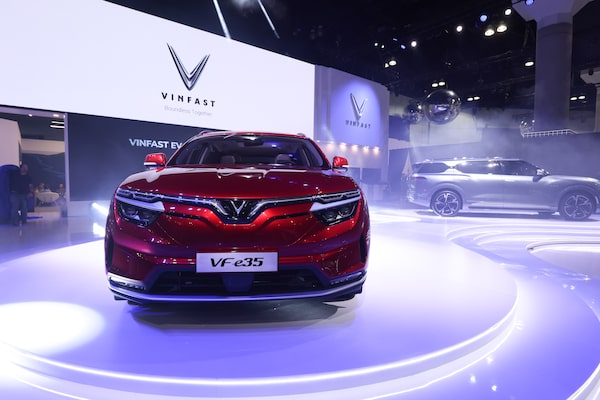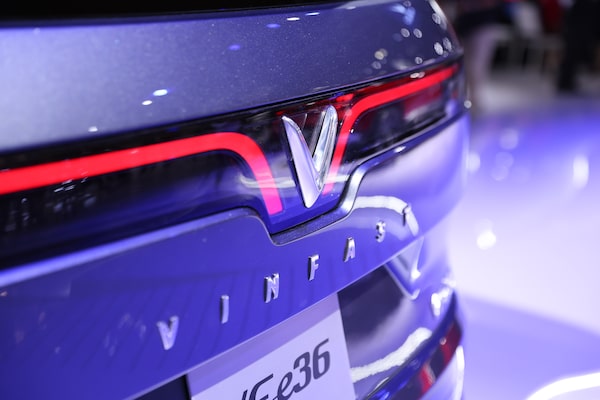
The two all-electric VinFast SUVs launching next year have an estimated driving range of 460 to 680 kilometres, depending on the model, as rated on the generous WLTP test.Courtesy of manufacturer
Canadians could be driving Vietnamese electric SUVs in late 2022, if all goes according to an ambitious global expansion plan by VinFast, Vietnam’s first domestic auto manufacturer.
The all-electric VF e35, a mid-size SUV, will be in VinFast’s Canadian showrooms in the fourth quarter of next year, while the larger, full-size VF e36 electric SUV will arrive in early 2023, according to Michael Lohscheller, CEO of VinFast Global. Preorders for Canadians are slated to begin in the first half of next year, but pricing has yet to be announced.
Lohscheller says he considers Canada an important market with good potential for EV adoption, which is why VinFast is aiming to have 38 company-owned retail stores across the country by the end of 2023. The exact locations are still being determined, Lohscheller says, but as with Tesla stores, expect to see them first in downtown centres, malls and suburban areas around the likes of Toronto and Vancouver.
The company will simultaneously launch in Europe and the United States next year, with 60 showrooms and service centres planned for California alone. The plans are ambitious, acknowledges Lohscheller, who was previously CEO of Opel Automobiles, a division of Stellantis.
Crucially, unlike other automotive startups making a splashy debut at the recent Los Angeles Auto Show, VinFast is unique in that it is already an auto maker, having launched its first combustion-engine cars – based on older BMW platforms – in 2018. Last year the company sold nearly 30,000 vehicles in its home market.

VinFast is currently mass-producing a range of combustion-engine cars and e-scooters. The plant has capacity to build 250,000 cars annually.Courtesy of manufacturer
At its sprawling 335-hectare factory in Vietnam, VinFast is currently mass-producing a range of combustion-engine cars and e-scooters. The plant has capacity to build 250,000 cars annually.
“They built the factory in like 12 months,” Lohscheller told the Globe and Mail in an interview. “I mean, if we do a factory in Europe it takes a minimum of maybe 36 months.” Compared with long-established car companies, the level of ambition at VinFast is different and everything happens faster, he says.
VinFast’s parent company Vingroup JSC, Vietnam’s largest conglomerate, has invested US$5.4 billion into the auto maker, according to Lohscheller. (For scale, three years ago, when Rivian made its debut at the L.A. Auto Show, its CEO said the company had put roughly half-a-billion dollars into the business at that point.)
“We will need more money,” Lohscheller adds, which is why he says the company is eyeing a U.S. initial public offering in the next year or two.
VinFast is also planning to open a factory south of the border in the second half of 2024. Its location will be decided in the coming months, but wherever it is, Lohscheller expects the factory to draw upon Canadian suppliers.
“We will have a deep localization of our supply chain in North America, and of course that will include Canada.”
The two all-electric VinFast SUVs launching next year have an estimated driving range of 460 to 680 kilometres, depending on the model, as rated on the generous WLTP test. Preliminary specifications for both vehicles include dual-motor all-wheel drive, up to 402 horsepower, and a full range of Advanced driver-assist systems, including remote parking. Other features listed include on-board video games and location-based advertising.
Lohscheller says he considers Canada an important market with good potential for EV adoption, which is why VinFast is aiming to have 38 company-owned retail stores across the country by the end of 2023.Courtesy of manufacturer
Lohscheller says the SUVs on display in L.A. are 99.99 per cent production-ready, and they are currently undergoing testing and homologation. The full-size VF e36 at the show didn’t have a complete interior cabin, but the mid-size VF e35 appeared ready to drive.
Both models will be covered by an unusually long 10-year warranty, which applies to the whole vehicle, not just the battery.
Customers who buy a VinFast EV will be able to rent the vehicle’s battery pack separately. The idea could potentially lower the high upfront purchase price of EVs, which has traditionally been a significant barrier to adoption. VinFast claims battery rental costs would be similar to the monthly expense of gas.
The vehicles will be sold through a direct-sales model, similar to Tesla, rather than through third-party dealerships. After placing an order, VinFast customers can expect notifications, receiving lots of communication from the company, says Hans Ulsrud, chief growth officer of VinFast Canada.
“Maybe there are gifts along the way, or maybe there are benefits to being an early adopter. When you put in a reservation and then the only contact you get is, ‘sorry your car’s going to be late,’ that’s not really surprise and delight.
He’s eager to build a community of fans around the brand.
Customer service is one area Lohscheller thinks VinFast can stand out in the already-crowded automotive marketplace. “In Vietnam, you really have a service culture,” he explains. “If you look at the [auto] industry, people are quite happy with the product quality of most players … but very unhappy with service.”
When the first VinFast SUVs hit the road late next year, we’ll start to see if the company can make good on its lofty ambitions.
Shopping for a new car? Check out the Globe Drive Build and Price Tool to see the latest discounts, rebates and rates on new cars, trucks and SUVs. Click here to get your price.